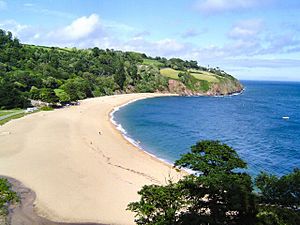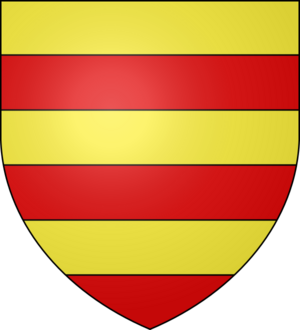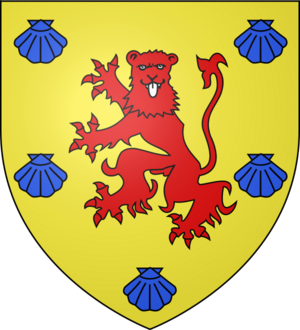Battle of Blackpool Sands facts for kids
Quick facts for kids Battle of Blackpool Sands |
|||||||
|---|---|---|---|---|---|---|---|
 Blackpool Sands, Dartmouth |
|||||||
|
|||||||
| Combatants | |||||||
| William du Chastel's fleet | John Hawley's defensive forces | ||||||
The Battle of Blackpool Sands was a fight that happened in April or May 1404. French forces tried to attack the important port town of Dartmouth in South Devon, England. But local English fighters stopped them! They captured many French soldiers and even killed the French leader, William du Chastel.
Contents
Why the Battle Happened
The early 1400s were a busy time for ships in the English Channel, the sea between England and France. Both sides often raided each other's coasts.
In August 1403, a French leader named William du Chastel attacked Plymouth, an English town, causing a lot of damage. The English fought back! In October 1403, a fleet led by John Hawley from Dartmouth captured seven French merchant ships. Then, in November, Sir William Wilford led an English attack on Brittany, a part of France, capturing 40 ships and damaging the land.
Even in winter, the fighting continued. In December, French forces tried to attack the Isle of Wight but were pushed back. In the spring of 1404, French raiders hit Portland and Weymouth. These attacks set the stage for the Battle of Blackpool Sands.
The French Attack Fleet
In April or May 1404, William du Chastel gathered a large fleet of 300 ships in St. Malo, a French port. He had 2,000 knights and soldiers, plus light infantry and crossbowmen. His main goal was to attack Dartmouth.
But the French fleet had problems right away. On the first day, some ships attacked friendly Spanish wine ships by mistake! Even though order was restored, parts of the fleet broke away. This meant du Chastel sailed towards Dartmouth with fewer ships than he planned.
He arrived at Blackpool Sands, a wide beach about 3 miles (4.8 km) southwest of Dartmouth. He dropped anchor and waited for six days for his full fleet to gather.
Dartmouth Prepares to Defend
The six days the French waited gave the English time to prepare. John Hawley, a local merchant and former Mayor of Dartmouth, quickly organized the town's defense.
Local men joined the fight, along with troops from inland areas. Even many local women helped! French sources claimed there were 6,000 English defenders, but this number was likely much too high.
The English built a strong defense at Blackpool Sands. They dug a ditch filled with water, which could only be crossed by a narrow path. They waited for the French to attack. John Hawley himself didn't fight in the battle. The exact English commander is not known, but the Earl of Warwick may have advised Hawley on how to set up the defenses.
The Battle Begins
After waiting for six days, the French fleet still wasn't fully together. Du Chastel and one of his vice-admirals, de Jaille, decided to land and attack with the soldiers they had. They only had about 200 men-at-arms (heavily armed soldiers).
Du Chastel thought they should try to go around the English defenses. But de Jaille insisted on a direct attack, even accusing du Chastel of being scared. Feeling insulted, du Chastel immediately ordered the attack.
The French soldiers landed and got ready to fight. Usually, they would send crossbowmen first to shoot arrows, but this time, the heavily armed men-at-arms led the charge. As they moved forward, English archers behind the ditch shot at them. Local women in the English army also threw stones at the French.
The main attack was on the narrow path across the ditch. The French couldn't push the English back. Some French tried to wade through the ditch, and a few drowned. Others managed to cross but couldn't get a strong hold on the other side and were forced back.
Finally, the French gave up and tried to retreat to their ships. Du Chastel refused to leave and was killed. Many French soldiers were killed as they fled, and about 100 prisoners were taken. This included three French lords and 22 knights. Two of du Chastel's brothers were also captured.
What Happened Next
News of the English victory quickly reached London. A special thanksgiving service was held at Westminster Abbey, and the king, Henry IV, attended.
On May 25, King Henry IV asked the Mayor of Dartmouth to send five of the French prisoners to Nottingham. The king had learned about a plot against him and wanted to know if the Dartmouth raid was connected. A Welsh soldier was also captured, so the king wanted to check for any links to Owain Glyndŵr's revolt in Wales.
The Battle of Blackpool Sands didn't stop the fighting for long. There's a story that Tanneguy du Chastel, William's brother, led another, more successful raid on Dartmouth later that year to get revenge. French raids continued along the Channel coast in 1404 and into 1405.
Images for kids
 | DeHart Hubbard |
 | Wilma Rudolph |
 | Jesse Owens |
 | Jackie Joyner-Kersee |
 | Major Taylor |




